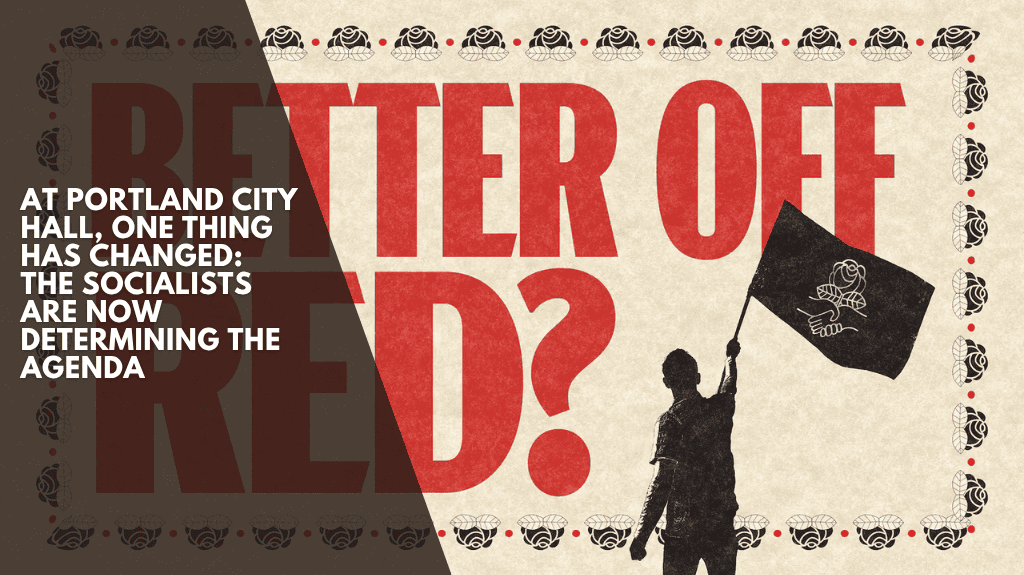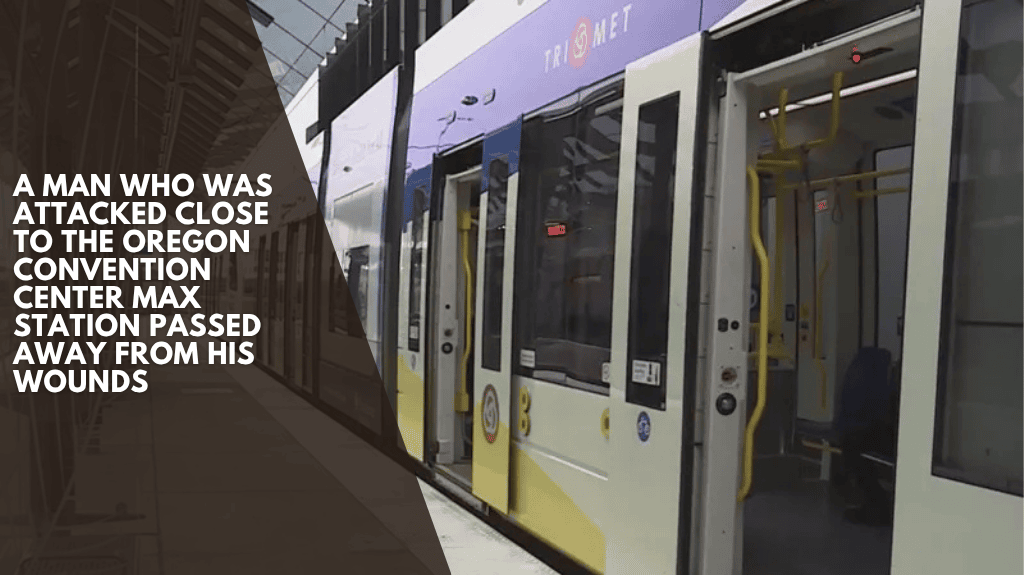For the first time in living memory, Portland in effect has two viable political parties—and the second one isn’t the Republicans.
Councilor Angelita Morillo believes that a better Portland is possible.
Morillo is a member of the Democratic Socialists of America’s Portland chapter, which frequently uses this phrase. The DSA defines “better” as follows:
Garbage pickup is free. Buses and trains are fareless. Government-run grocery stores with price controls. A downtown where some office towers have been replaced with subsidized housing.
If anyone in those apartments faces eviction, they will be assigned an attorney. Residents of those buildings drop their children off at tuition-free preschools before going to work in jobs with a higher starting salary.
Who pays for all of this? Any resident with a substantial income. What is the height? The DSA won’t say how much it will cost, but based on recent ballot initiatives, it could start at $200,000 annually.
“We essentially have to redesign our entire economy right now,” says Morillo, who represents District 3 (Southeast Portland) on the Portland City Council.
Whether they realize it or not, this is the future that many Portland voters chose last fall.
Voters chose 12 city councilors from four geographic districts to establish policy. The idea behind an expanded council and geographic representation was for Portlanders to elect a more diverse group of officials—by age, race, and professional experience—than ever before. And neighborhoods far from City Hall would have someone advocating for their interests.
To some extent, the new form of government met these objectives. In addition, it appointed four Democratic Socialists of America members to the council.
That advocacy nonprofit has long been a driving force in Portland politics on the left, from Burgerville union drives to new taxes on C-suite executives.
However, the election of Morillo and her three fellow socialists means that, for the first time in living memory, Portland now has two viable political parties—and one of them is not the Republicans.
Technically, the DSA is not a political party. And city councilor is not a partisan position. However, the Portland chapter of the DSA states in its own materials that it wants the candidates it supports to “criticize the Democratic Party establishment and put forward the necessity for a socialist party and a rupture with the Democratic Party.”
The “hot socialist summer” is a trend in the United States as progressives become increasingly dissatisfied with what they see as a Democratic Party incapable of providing a viable alternative to President Donald Trump’s authoritarian agenda. In New York City, DSA member Zohran Mamdani is on the verge of winning the mayor’s election.
However, no major American city has elected socialists as a third of its city council. Not Seattle. Not San Francisco. The closest is Minneapolis, where socialists have four seats on a 13-member council.
And six months into the new body’s reign, a dozen City Hall observers tell WW that Portland’s agenda and discourse are largely being driven by a cohesive bloc of leftist council members—led by socialists.
To put the DSA’s clout in perspective, there are over 56,000 registered Republicans in Multnomah County, but those Republicans wield only a fraction of the influence on City Hall that the DSA’s 2,000 members do.
Some skeptics claim this is no accident. “In my opinion, this electoral system was designed in part to emphasize groups like DSA that, rather than a broad electoral coalition, represent a slice,” says Doug Moore, who ran a Portland Metro Chamber-created political action committee last fall.
Moore and others in Portland believe that taxes are too high, particularly for the highest earners. According to anecdotes and government revenue data, some people earning more than $500,000 per year are fleeing the nation’s second-highest marginal tax rate.
The DSA disagrees. According to them, the wealthy are paying far too little.
“The wealthiest people in Portland should be paying more or their fair share in order to make sure all our services that we want continue to function,” Morillo declares. “If we’re doing anything, it’s going to be coming from the people who are making the most.”
It’s not surprising that Democrats are nervous. The anxiety extends all the way up to Gov. Tina Kotek, who is attempting to repeal Preschool for All, which the DSA regards as the city’s closest thing to a socialist program.
“We have a council that’s not afraid to tax the rich,” says Morillo. “There’s pressure from the governor’s office not to look into any of that, and I think there will be a lot of pushback on her vision.”
Councilor Mitch Green has a golf-related injury. He uses his right leg to get up the City Hall stairs to his second-floor office. He strained his left meniscus while golfing in Bend.
Golf is not a typical socialist hobby. Green, who is bald and bearded, resembles Vladimir Lenin’s cuddly cousin (a resemblance he winks at with a picture in his office of his head superimposed on Lenin’s body), but he’s more likely to be found drinking beers on the 19th hole than standing on a soapbox denouncing capitalism.
It doesn’t matter. He is one-quarter of the socialist councilors who are revolutionizing Southwest Third Avenue.
Green is the group’s plucky middle-aged data nerd. He is an economist who previously worked for the Bonneville Power Administration and produces reports that argue that Portland’s wealthy population is growing rather than shrinking.
Morillo is a social media-savvy firebrand known for roasting centrists with witty one-liners on the podium. She proudly displays a “hot socialist summer” poster inside City Hall, with the slogan splashed across a photo of Mamdani.
Tiffany Koyama Lane is a cheerful former third-grade teacher who wants everyone to get along but is trying to overcome her reputation as a conflict-avoider.
Sameer Kanal, the studious and serious police accountability hawk who pontificates at length on the dais, holds a master’s degree in global affairs from New York University and has worked in several major cities as a researcher, consultant, and in various roles for Model United Nations.
The four councilors have advocated for the DSA’s agenda more frequently and effectively than any other interest group in the city.
“No other nonpartisan group that did endorsements or got involved has ever put together a caucus like this,” says Councilor Eric Zimmerman, a centrist who frequently clashes with the DSA quartet. “A standing caucus is not something I’ve ever seen at the city.”
The spring budget season demonstrated this dynamic, as the council debated and voted on budget amendments from all 12 councilors over 35 hours, with the most contentious ones involving policing and economic development.
The progressive bloc, with the four socialists at its core, moved much more consistently than the centrists, who appeared flustered by the bloc’s coordination.
“It was so refreshing to see them move as a bloc, and you can tell it’s driven by their principles,” says Olivia Katbi, a full-time advocate, outspoken Gaza supporter, and DSA Portland chapter co-chair.
“You can see the other councilors struggling to find their seats and understand how to vote or what to do. Because I don’t think they’re motivated by a larger belief system.”
While the DSA has not always been successful in passing policy, it has shaped the terms of City Hall conversations, causing the centrists on council to play defense more often than not.
Kanal proposed increasing, and in some cases studying, a variety of fees, including those for golf and vacant apartments, as well as stricter oversight of the Portland Police Bureau’s overtime budget. Morillo successfully directed $1.8 million from the Golf Fund to parks and the city’s Small Donor Elections program, and she advocated for the redirection of $2 million earmarked for the police bureau to fund park maintenance.
This was consistent with DSA leadership’s broader distrust of police, which they expressed in the spring when they successfully blocked the Portland Police Association’s attempt to join a larger labor guild. Morillo spoke shortly after at a DSA panel, urging the police to “submit to a truth and reconciliation commission” before being admitted.
The Police Bureau eventually balanced its budget, and the Parks Bureau maintained its new funding. However, the Portland Metro Chamber, the city’s chamber of commerce, spent weeks lobbying to secure $2 million for the bureau, which PPB ultimately found in its own budget.
Another DSA target is the city’s approach to economic development.
DSA co-chair Katbi testified in support of Green’s May proposal to deprive Prosper Portland, the city’s economic development agency, of its $11 million annual funding from the city.
Green has criticized Prosper Portland and its checkered history of gentrification in neighborhoods where it established urban renewal districts since taking office. Katbi testified that Prosper Portland has a track record of “directing public funds for unaccountable private profit-making.”
Green’s proposal failed, but not before Prosper Portland executives were caught disparaging him in a group chat, prompting Mayor Keith Wilson to demand the agency’s director resign.
There’s a reason the socialist caucus almost always moves in lockstep.
The four councilors have a standing monthly meeting with a committee of the Portland chapter of the DSA. It’s the only external political group that holds regular meetings with a third of the council. The labor unions don’t do it. The Portland Metro Chamber doesn’t.
That’s an impressive influence for an organization with a budget of less than $70,000 per year and only 2,000 dues-paying members. (To be sure, far more Portlanders who aren’t members support the group’s vision.)
It’s also a sea change. For decades, the most powerful lobbying groups at City Hall were labor unions and the business lobby, which was represented by the Metro Chamber. On occasion, environmental groups and nonprofit coalitions were successful.
Meanwhile, the DSA circled the perimeter of City Hall. Former City Commissioner Amanda Fritz described the DSA as “kind of a fringe group, as far as I can remember.”
Katbi, speaking with WW on a bench in Peninsula Park, agrees that her group lacked influence. “Nothing was possible with one sometimes-ally on council,” according to her. “There was no way we were going to get anything passed.”
Much of the DSA’s efforts were focused on ballot measures, in part because Oregon makes it relatively simple to place a measure on the ballot with signatures, which is exactly what the DSA does best.
In 2020, after gathering signatures for a universal preschool measure, the DSA abandoned it in favor of promoting Preschool for All, a Multnomah County program funded by a marginal tax on high-income earners that aims to provide a free preschool seat to any family that requests it.
It was the quintessential socialist policy: the government providing free services on the dime of Portland’s wealthiest residents.
In 2023, the DSA attempted again, crafting a ballot measure to levy a 0.75% capital gains tax to fund free legal services for anyone facing eviction. Opposition highlighted two major flaws: It failed to exempt retirement account withdrawals and home sales. The measure received the highest rejection rate in three decades of local ballot measures, with four out of five voters saying no.
According to longtime lobbyist Amy Ruiz, the DSA was not taken seriously because they had ideological goals but no idea how to write a good policy or where to get the money to fund them. “You can’t just wish it was there,” Ruiz explains.
Nonetheless, the DSA’s signature red shirts became a common sight at Palestinian rallies and picket lines during the Portland Association of Teachers’ strike in 2023.
The DSA and the teachers’ union, which is the most powerful interest on the school board, have opposing views on both local policy and international issues such as the Gaza war.
PAT president Angela Bonilla has spoken at DSA events, and Councilor Koyama Lane began her political career as a PAT organizer.
The DSA saw an opportunity in November 2022, when Portland voters approved an overhaul of city government and elections, increasing the number of members elected in districts from five to 12.
Ranked choice voting meant that any candidate who received 25%+1 of the vote would be elected—a significantly lower threshold than for any other office.
In a March 2023 blog post, the local chapter stated that the government restructuring “presents an extraordinary opportunity for Portland DSA to disrupt the capitalist municipal order.”
It endorsed only two candidates, in contrast to other interest groups that gave lukewarm support to a dozen office seekers. DSA volunteers knocked on 10,000 doors in Green and Koyama Lane. Both won, as did Kanal, another chapter member.
On the drizzly afternoon of March 15, Morillo walked down the steps of City Hall, dressed in red pants, a red jacket, a red scarf, and a swatch of red lipstick, to join a “Tax the Rich” rally. Morillo stated that she was joining the DSA.
“This was us stepping up into more adult politics,” says Brian Denning, co-chair of the Portland DSA. “And I expect the Metro Chamber is concerned that their influence is waning.”
Green and his council colleagues claim they are not beholden to the DSA, but their values and policy objectives frequently overlap. The DSA does not give Green “marching orders,” he claims, but it does provide plenty of input.
“Their intention was to never organize to get me in office and then walk away,” Green explains.” “I haven’t experienced this yet, but the expectation is that if I do something way out of line with the values of the organization, I’m going to hear about it.”
Katbi expects the four councilors to follow the chapter’s candidate requirements. Candidates, for example, must meet on a regular basis with the new Socialists in Office Committee.
“We want to put someone in office who is going to bring DSA with them to office,” Katbi states. “Our councillors are DSA. So what they’re doing is DSA until further notice, unless we specify otherwise.”
So what do they do?
The DSA introduced the Family Agenda, a new policy platform, in April. They want the council to pass a Renters’ Bill of Rights, which would require landlords to provide more relocation assistance, ban nonpayment evictions if the tenant is a teacher or student during the school year, prohibit evictions during extreme weather events, and “establish a right to counsel in eviction court,” among other provisions.
(Five councilors—Councilor Jamie Dunphy and four socialists—signed a campaign pledge to support it.) The chapter also wants the council to raise the rate of the CEO tax. They intend to go door-to-door in support of the Parks Levy renewal this fall.
While it is not explicitly stated in the agenda, socialists clearly oppose any power structure that they believe favors established interests.
That explains why DSA councilors have questioned who Council President Elana Pirtle-Guiney gives the microphone to (see sidebar here), as well as why they helped lead a disastrous campaign to freeze $64 million in funding for child-serving nonprofits, claiming the grants process was inequitable.
And, unlike the council’s centrists, who are constantly concerned about the state of downtown, the socialists see the emptying of office towers as a feature, not a bug.
The U.S. Bancorp Tower (also known as Big Pink) recently sold for $45 million, a decrease from its $372 million price tag in 2015. Green isn’t worried.
“Buildings being sold for pennies on the dollar is healthy because then it takes it into someone’s balance sheet that’s fresh and new and their cost basis is lower,” says Green, “so they can charge lower rents.”
And what about the city’s loss of property tax revenue as a result of steeply discounted office high-rise prices? “Some property tax revenue is better than no tax revenue,” Green explains. “I’m not interested in policies that try to protect the absentee owners to make them whole.”
Indeed, the DSA’s vision encompasses a complete overhaul of the current political system. It’s a vision in which capitalism is almost non-existent. Executives would give up a significant portion of their income each year so that the city could fund free garbage service, a fare-free transit system, and city-run grocery stores.
National anchor tenants in downtown’s high-rises would vacate, allowing smaller businesses to move in. The city would buy properties and build thousands of affordable housing units on top of them.
Koyama Lane, for example, is interested in charging a fee to commercial property owners that have vacant properties. She’s heard some of these owners might be intentionally keeping spaces vacant to receive tax breaks.
“There’s a possibility that’s happening,” Koyama Lane says. (Local governments do not in fact offer tax breaks for vacant spaces. But when a building has lots of vacant space, its market value drops, which in turn lowers the property tax.)
Koyama Lane sees Block 216, the Ritz-Carlton tower, as an example of developers exploiting the city. “I view the Ritz as a very big bummer,” she says. “Developers didn’t want to put in affordable housing, so they paid a fee [and didn’t perform]. How do we hold developers accountable?”
Some small business owners are wary.
James Armstrong runs three eye care clinics in District 2 and ran for City Council in the fall. He says he’s concerned the council is getting too caught up in debates about economic class.
“We have a lot of large issues to tackle that are going to cost money,” he says. “And when we talk about socialism versus whatever the opposite is, it’s an argument over where the money is going to come from. But we’re not some hotbed of huge wealth, so there might not just be that coffer to pull from.”
He asks, “So then what? Are we going to get stuck in this stalemate of the morality of who pays for it, or are we going to have a council that focuses on finding solutions?”
Portland also has a new mayor: Keith Wilson, a buttoned-up freight executive. Wilson is unwavering on his goals: build 1,500 shelter beds by the end of the year and spur housing development, in part by waiving system development charges for developers seeking to build housing.
Though the DSA has historically railed against any measure it perceives as offering a handout to developers, it declined to comment on Wilson’s agenda. That may be because City Hall sources tell WW that at least a few of the socialist councilors are open to the SDC waiver.
Wilson declined to comment.
In fact, the socialists will have to defend their policy accomplishments not only in boardrooms, but also among the state’s top Democrats. Gov. Tina Kotek stands out among Democrats.
Kotek, who spent much of her political career as a favorite of organized labor, has expressed growing concern that local tax policies are undermining Oregon’s economic foundation. Her primary target: Preschool for All.
The DSA hails the Multnomah County initiative as the first time Portlanders fully committed to a socialist-values-based program: taxing the wealthy to provide subsidized child care and early education to working parents and low-income children. The program is supported by a 1.5% tax on income over $125,000 for single filers or $200,000 for joint filers, plus an additional 1.5% on income over $250,000 for single filers or $400,000 for joint filers.
Kotek claims that burden is driving high-income taxpayers out of Oregon, depriving the state of much-needed revenue. She spent much of the spring attempting to persuade Multnomah County Chair Jessica Vega Pederson to pause collection and lower the tax rate, despite the fact that revenues have far exceeded expectations and are largely unutilized.
“If Portland does not rebound in the way we think it can,” Kotek wrote to Vega Pederson during the summer, “the downstream impacts on our economy will end up costing our most vulnerable and lowest income Oregonians the most.”
Vega Pederson declined.
Late in the legislative session, key Democratic lawmakers introduced a bill amendment that went even further: it would prohibit Multnomah County from collecting the Preschool for All tax or establishing another similar one.
Morillo responded immediately when she saw the amendment drop. “My God, can these clowns ever stop clowning?” she inquired on Bluesky. We get it! You are obedient business dogs! Lick their boots some more; I believe you missed a spot!”
The amendment failed in committee. But Morillo is still bracing for battle and questions the sources who claim Kotek taxpayers are fleeing.
“If your data is explicitly coming from the people that don’t want to give up their wealth, that needs to be more heavily scrutinized,” she argues. “I think that’s who [Kotek] meets [with] regularly and who’s in her ear.”
Instead, she says she believes Green’s analysis of tax return data from June shows that the city’s high-income population is growing rather than shrinking.
Katbi interprets Kotek’s concern as plutocratic revenge. “They’re trying to shut down PFA because Jordan Schnitzer wants them to,” she tells me. “Because [Kotek’s] rich friends are mad about it.”
Elisabeth Shepard, a spokeswoman for “the suggestion that the governor’s desire for a well-rounded and sustainable tax base is for any purpose other than the functionality of services in Multnomah County, and the future prosperity of the region and our state, reflects a fundamental misunderstanding of what’s at stake in this conversation.”
The fight over Preschool for All is at the heart of the divide between the DSA and the Democrats. The governor believes the socialists pose a threat to the state’s economic recovery. The DSA and socialist councilors believe Kotek and Democrats would rather appease the rich than help the poor.
Morillo cites Kotek’s strong recommendation to local governments in 2023 to impose no new taxes for three years. “That’s an agreement we didn’t agree to,” Morillo says of the council and especially her socialist colleagues, “because we just got here.”
Moore, who runs the Metro Chamber-founded political action committee United for Portland, believes the “socialists are trying to take over the City Council and turn it into an ideological showcase for the rest of the country.” The chamber’s goal is “to stop the DSA from taking over the council.”
It is still unclear whether Portland’s shift to the left, at a time when many of its peer cities are moving to the center, is the result of a new election system or a reflection of where voters want the city to go. But that will be clear soon. Three of the four socialists, Green, Koyama Lane, and Morillo, represent Districts 3 and 4, which will hold elections in 2026.
This means Portlanders can no longer be surprised by the results of the previous election. They either support the revolution or don’t.
Morillo believes the socialists have an advantage because they are the only group delivering for the people the new government is intended to elevate. “You can say you care about all these disadvantaged groups,” she replies, “but if you’re not doing anything to rectify their economic situation and you’re listening to the power brokers at the Metro Chamber, then you don’t really care.”












